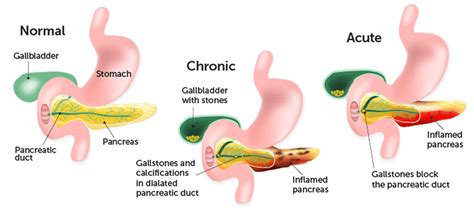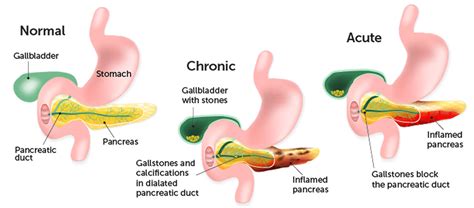

Pancreatitis is a serious inflammation of the pancreas that can cause severe abdominal pain, nausea, vomiting, and other symptoms.
Pancreatitis is a condition that can strike anyone, at any time. Whether you’re young or old, healthy or not, it’s important to know the signs and symptoms of this potentially life-threatening disease. With its sudden onset and intense abdominal pain, pancreatitis can be a scary experience. But what exactly is pancreatitis, and how does it affect the body? In this article, we’ll take a closer look at this condition, exploring everything from its causes and symptoms to its treatment options and long-term effects. So sit back, relax, and get ready to learn all about pancreatitis.
Daftar Isi
Pancreatitis: Understanding the Condition
What is Pancreatitis?
Pancreatitis is a medical condition characterized by inflammation of the pancreas. The pancreas is a vital organ located behind the stomach that produces digestive enzymes and hormones that regulate blood sugar levels.
Causes of Pancreatitis
The most common causes of pancreatitis include heavy alcohol consumption, gallstones, and high levels of triglycerides in the blood. Other less common causes include viral infections, autoimmune disorders, and certain medications.
Symptoms of Pancreatitis
The symptoms of pancreatitis can range from mild to severe. They include abdominal pain (that may radiate to the back), nausea, vomiting, fever, rapid pulse, and swollen abdomen.
Diagnosis of Pancreatitis
Doctors diagnose pancreatitis through a combination of medical history, physical examination, blood tests, imaging tests such as CT scans or MRI, and sometimes a biopsy of the pancreas.
Treatment of Pancreatitis
Treatment for pancreatitis depends on the severity of the condition. Mild cases may require only pain relief and a short period of fasting, while severe cases may require hospitalization, intravenous fluids, and nutrition support. In some cases, surgery may be necessary to remove damaged tissue or treat complications.
Complications of Pancreatitis
Severe cases of pancreatitis can lead to serious complications such as infection, pancreatic cancer, diabetes, and organ failure. In some cases, chronic pancreatitis can develop, which can cause permanent damage to the pancreas and affect overall health.
Prevention of Pancreatitis
Preventing pancreatitis involves avoiding or limiting alcohol consumption, maintaining a healthy weight, managing cholesterol and triglyceride levels, and avoiding certain medications that can cause pancreatitis.
Lifestyle Changes for Pancreatitis Patients
Patients with pancreatitis are often advised to make lifestyle changes such as avoiding alcohol, quitting smoking, and following a low-fat diet. They may also need to take enzyme supplements to aid digestion and manage blood sugar levels.
Outlook for Pancreatitis Patients
The outlook for pancreatitis patients depends on the severity of the condition and the underlying cause. Mild cases have a good prognosis, while severe cases require prompt medical attention and can have serious complications.
The Importance of Seeking Medical Help
If you experience symptoms of pancreatitis, it is important to seek medical help immediately. Early diagnosis and treatment can prevent complications and improve outcomes.Understanding Pancreatitis: Definition and TypesPancreatitis is a disease that causes inflammation in the pancreas, an organ located behind the stomach responsible for producing digestive juices and insulin. There are two types of pancreatitis: acute and chronic. Acute pancreatitis occurs suddenly and is often a medical emergency that requires hospitalization. Chronic pancreatitis develops over time and may lead to permanent damage to the pancreas. Both types can cause severe pain and affect the body’s ability to digest food properly.Causes of PancreatitisSeveral factors can contribute to the development of pancreatitis, including lifestyle choices such as heavy alcohol consumption, smoking, and a diet high in fat. Medical conditions, such as gallstones, infections, and genetic predisposition, can also play a role in the development of pancreatitis.Symptoms of PancreatitisCommon symptoms of pancreatitis include abdominal pain, nausea, vomiting, fever, and rapid heart rate. In acute pancreatitis, symptoms often appear suddenly and intensely, while in chronic pancreatitis, mild symptoms may develop slowly over time. It is essential to seek medical attention if experiencing any of these symptoms, as pancreatitis can lead to serious complications.Diagnosis of PancreatitisDoctors may use various tests to diagnose pancreatitis, including blood tests, imaging tests (such as CT or MRI scans), and endoscopic retrograde cholangiopancreatography (ERCP). Accurate diagnosis is crucial for proper treatment and management of the condition.Treatment Options for PancreatitisTreatment for pancreatitis depends on the severity of the condition and may include medications, dietary changes, and surgery. In some cases, hospitalization may be necessary for IV hydration and pain control. The primary goal of treatment is to manage symptoms, prevent complications, and preserve pancreatic function.Complications Associated with PancreatitisPancreatitis can lead to several serious complications, including infections, pseudocysts (fluid-filled sacs), pancreatic necrosis (dead tissue), and diabetes. Early diagnosis and treatment can help prevent these complications.Prevention of PancreatitisPreventing pancreatitis involves making lifestyle changes, such as limiting alcohol consumption and avoiding foods that are high in fat. Treating underlying medical conditions and maintaining a healthy weight can also help prevent pancreatitis.Pancreatitis in ChildrenAlthough rare, pancreatitis can also affect children. Symptoms in children may include abdominal pain, fever, nausea, vomiting, and diarrhea. Prompt diagnosis and treatment are essential for the best possible outcome in children with pancreatitis.Pancreatitis and Pancreatic CancerChronic pancreatitis has been linked to an increased risk of pancreatic cancer. Pancreatic cancer is a particularly deadly form of cancer, and early detection is key to successful treatment. Regular check-ups and screenings can help detect pancreatic cancer early.Living with Pancreatitis: Coping Strategies and ResourcesLiving with pancreatitis can be challenging, both physically and emotionally. Support groups, counseling, and lifestyle changes can all be helpful in managing symptoms and improving quality of life. It is essential to work closely with a healthcare provider to develop an individualized treatment plan and to seek support from loved ones and healthcare professionals.Pancreatitis is a medical condition that occurs when the pancreas, a gland located behind the stomach, becomes inflamed. This inflammation can cause severe pain and other complications. While pancreatitis can be a serious and potentially life-threatening condition, there are pros and cons to consider when evaluating treatment options.Pros:1. Early diagnosis and treatment can prevent further damage to the pancreas and improve outcomes for patients.2. In some cases, pancreatitis can be managed with lifestyle changes such as avoiding alcohol and fatty foods, reducing stress, and maintaining a healthy weight.3. Surgery may be an effective option for patients with severe or chronic pancreatitis, particularly if it is causing complications such as blockages in the digestive system.4. There are several medications available that can help manage symptoms of pancreatitis, including pain relievers and enzymes to aid digestion.Cons:1. Severe cases of pancreatitis can lead to complications such as infection, pancreatic necrosis (death of tissue), and organ failure.2. Treatment options for pancreatitis can be expensive and may require multiple hospitalizations and procedures.3. Some patients may experience long-term complications such as diabetes and malnutrition as a result of pancreatitis.4. While surgery can be effective for some patients, it carries risks such as bleeding, infection, and damage to surrounding organs.Overall, pancreatitis is a complex condition with potential risks and benefits to consider. It is important for patients to work closely with their healthcare providers to develop a treatment plan that is tailored to their individual needs and goals.
As a journalist, it’s important to report on health issues that can have a significant impact on people’s lives. One such issue is pancreatitis. This condition occurs when the pancreas becomes inflamed, which can cause severe abdominal pain, fever, and other symptoms. While there are different types of pancreatitis, the most common are acute and chronic pancreatitis.
If you or someone you know has been diagnosed with pancreatitis, it’s crucial to seek medical attention right away. Acute pancreatitis can be life-threatening if left untreated, while chronic pancreatitis can lead to more serious complications over time. Treatment for pancreatitis typically involves managing symptoms, such as pain and nausea, and addressing any underlying causes, such as gallstones or excessive alcohol consumption.
In conclusion, pancreatitis is a serious health issue that should not be taken lightly. If you’re experiencing symptoms of pancreatitis, such as severe abdominal pain, seek medical attention immediately. With proper treatment and management, it’s possible to live a healthy life with pancreatitis. Stay informed and take care of your health.
Video pancreatitis
Visit VideoPancreatitis is a medical condition that affects the pancreas, which is an organ located behind the stomach. This condition occurs when the pancreas becomes inflamed and can cause severe abdominal pain, nausea, and vomiting. Here are some common questions that people ask about pancreatitis:
1. What causes pancreatitis?
Pancreatitis can have many causes, but the two most common are gallstones and heavy alcohol consumption. Other causes can include high levels of triglycerides, certain medications, infections, trauma to the pancreas, and genetic factors.
2. What are the symptoms of pancreatitis?
The symptoms of pancreatitis can vary from person to person, but the most common ones include severe abdominal pain that may radiate to the back, nausea, vomiting, fever, rapid pulse, and a swollen or tender abdomen.
3. How is pancreatitis diagnosed?
Pancreatitis is typically diagnosed through a combination of physical examination, blood tests, imaging tests such as CT scans or MRIs, and sometimes endoscopic procedures.
4. How is pancreatitis treated?
Treatment for pancreatitis varies depending on the severity of the condition. Mild cases may only require hospitalization and IV fluids, while more severe cases may need surgery or other interventions. In some cases, lifestyle changes such as quitting alcohol or changing diet may be necessary to prevent future bouts of pancreatitis.If you are experiencing symptoms of pancreatitis, it is important to seek medical attention right away. Pancreatitis can be a serious and potentially life-threatening condition if left untreated.






